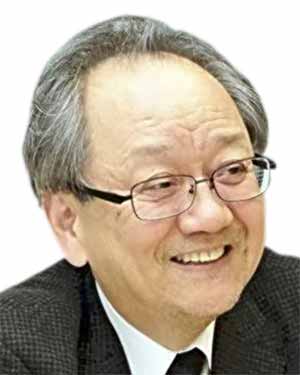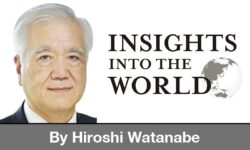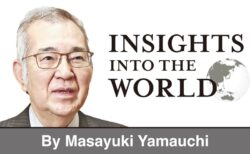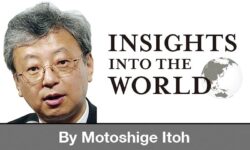18:07 JST, January 20, 2023
The year 2022 continued to be plagued by disasters and hardships. In February, when the novel coronavirus pandemic still looked unlikely to vanish anytime soon, Russia invaded Ukraine. The war is now threatening to drag on with no signs of peace talks to end it. Tensions remain high in East Asia, too, just as we ushered in the New Year.
To endure such difficulties, people wherever they are have no choice but to keep dealing with the circumstances with a tenacious mindset by doing their respective duties. But how should we develop strength of mind to tide over hardship? For that matter, what kind of relationship should people then have with their respective states, which are a man-made creation, and the communities where they live?
A state is apt to intervene in many aspects of people’s lives, absorbing a “spontaneous social effort” — a phenomenon that is observed not only in authoritarian countries. In liberal democratic countries, too, it has now become increasingly common to conceive that in the event of some difficulty, each state would come forward to assume responsibility to tackle it by undertaking a solution with its immense resources. Spanish philosopher Jose Ortega y Gasset described this tendency as the “nationalization of life.” Therefore, we now tend to believe that many of our demands can be immediately fulfilled by the state.
Take, for example, recent university reforms in Japan. Every part of the reforms has been implemented on the initiative of the central government, making us feel that a spontaneous social effort has been absorbed by the state. In the reform process, universities in the United States are referred to effectively as the model case for those in Japan, but it should not be forgotten that the United States had already had multiple universities well before it started as an independent country. Make no mistake, the history of U.S. universities is the chronicle of a spontaneous social effort and ingenuity.
We need not take for granted the growth of the central government’s role. Through our spontaneous activities in our respective communities, we come to know what the exercise of freedom means. In such an environment, we are required to have self-esteem about ourselves as the only and best subjects that decide on our interests.
While reconstructing in the aftermath of the Great East Japan Earthquake and taking on the novel coronavirus, we have learned that general arguments that do not take into account circumstances peculiar to each community are largely ineffective.
To deal specifically with things, it dawns on me again that it is essential to nurture mental strength to contain myopic feelings and maintain a tenacious attitude without being misled by empty words and general arguments.
In political narratives, there has been an obvious increase in cases of using ambiguous words myopically. Populism is a case in point. According to digital search data, how often this word was used by news outlets in English-speaking countries and with the Google search engine increased sharply in and after 2016, the year when Donald Trump was elected U.S. president against the odds.
Political scientists argue that the core of the concept of populism is the existence of “the people” at moral war with “the elite.” However, they say, the real meaning of populism has become blurred, with the core meaning inevitably cluttered by such images as rigid exclusivity, disdain for vulnerable out-groups, a quick temper averse to careful consideration, and the biased patriotism that tends to come with those who are susceptible to populism.
In this century, Europe has been seeing an increase in center-stage political influence wielded by right-wing parties that put their respective countries first. They include, among others, the U.K. Independence Party, the National Rally party of France, the Sweden Democrats party and the Jobbik (Movement for a Better Hungary) party. In contrast, populism in Latin America is mostly centered on a socialist policy of prioritizing the redistribution of wealth.
Nourish mind and body
Some people simply argue that fascism is approaching due to populism fueled by both left-wing and right-wing groups, but we need to be careful against arguing politics too roughly by using the word “populism.” Such a simplistic argument would only divide society, falling short of bringing order to it. This is because certain ambiguous words that strongly appeal to people’s emotions reduce their skepticism and impair loose social ties.
Language used in political discourse always has plenty of rhetoric that makes it impractical to apply a dichotomy to determine what is false or true. In reality, the political spectrum has “empty words” that mean neither falsity nor truth. This phenomenon in turn weakens trust in words and the inherent power of words to an extent that it emboldens simplistic and impulsive movements such as violent attacks on legislative branches.
One reason causing the spread of empty words, I assume, is the fact that the pace of modern social life has accelerated so much, making people too busy to keep their attitude to think tenaciously. In society, people need to have enough fortitude to refrain from making decisions lightly and coexist with those who have values different from theirs. While new technologies seeking to increase convenience have made life easier, they are unlikely to have a positive impact on people’s perseverance of spirit.
Human vitality is affected by the availability of nutrition and the amount of exercise in both mental and physical terms. The future of a nation hinges on the collective wisdom and morals of its population. However, given that intellect and morals are parts of the vitality, it should be noted that they are fostered in the stomach as well.
Over the course of the past half-century or so, Japanese people have become surprisingly physically larger. Nonetheless, their physical strength and athletic ability have been inversely on the decline. The findings of the 2022 school year’s national survey of physical strength, athletic ability and exercise habits, released recently by the Japan Sports Agency, showed that the total physical fitness scores for elementary and junior high school students in Japan, both male and female, were the lowest since the survey started in the current format in the 2008 school year. The agency surmised that the decline had resulted from increased access to digital devices and movement restrictions caused by the COVID-19 pandemic.
A decline in intellectual ability and in the capacity for language-based expression are greatly related to the two reading processes — digital versus paper — as well. As for this point, a series of comments by Maryanne Wolf, a U.S. neuroscientist and the author of “Reader, Come Home: The Reading Brain in a Digital World,” serves as a good reference. Her comments appeared in the column “Thinking towards the Future” in the morning edition of The Yomiuri Shimbun on July 12, 2020. Wolf says that digital mediums are good for skim-reading but that people tend to get nearsighted when immersed in digital reading. She adds that reading physical books, meanwhile, helps nurture a deep-reading brain.
It takes time to understand other people, a reality that is to remain unchanged. Once digital reading becomes the dominant form of reading, Wolf adds, people are likely to get so nearsighted that they feel irritated by those who do not have the same way of thinking, making it increasingly difficult to be tolerant with others.
Access to the internet will certainly gather further momentum in the future. Even under such circumstances, it remains true that physical strength is indispensable to cultivate an intellectual capacity that is tenacious enough to avoid myopic thinking. A tenacious mindset and physical strength do fundamentally empower people to fight against a myopic mindset that threatens the coexistence of people with different views, which is one of the intrinsic principles of liberal democracy.
“Populism” can be thought of as epitomizing a political movement poor in words but active in emotional, nearsighted activities. We should be careful not to let yielding, intolerant and egotistical mindsets unconsciously become complicit in a “nationalization of life” for our free society. It is not the central government but the people who foster the spontaneous social action essential for communities.

Takenori Inoki
Inoki is a professor emeritus at Osaka University, where he also served as dean of the economics department. He was a special professor at Aoyama Gakuin University from 2012 to 2016. Prior to that, he served as director general of the International Research Center for Japanese Studies from 2008 to 2012.
The original article in Japanese appeared in the Jan. 16 issue of The Yomiuri Shimbun.
Top Articles in Editorial & Columns
-

Riku-Ryu Pair Wins Gold Medal: Their Strong Bond Leads to Major Comeback Victory
-

40 Million Foreign Visitors to Japan: Urgent Measures Should Be Implemented to Tackle Overtourism
-

China Provoked Takaichi into Risky Move of Dissolving House of Representatives, But It’s a Gamble She Just Might Win
-

University of Tokyo Professor Arrested: Serious Lack of Ethical Sense, Failure of Institutional Governance
-

Policy Measures on Foreign Nationals: How Should Stricter Regulations and Coexistence Be Balanced?
JN ACCESS RANKING
-

Japan PM Takaichi’s Cabinet Resigns en Masse
-

Japan Institute to Use Domestic Commercial Optical Lattice Clock to Set Japan Standard Time
-

Israeli Ambassador to Japan Speaks about Japan’s Role in the Reconstruction of Gaza
-

Man Infected with Measles Reportedly Dined at Restaurant in Tokyo Station
-

Videos Plagiarized, Reposted with False Subtitles Claiming ‘Ryukyu Belongs to China’; Anti-China False Information Also Posted in Japan























